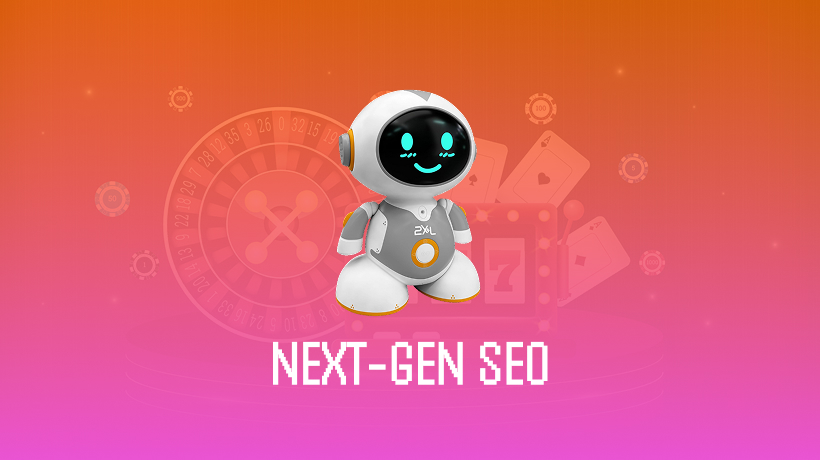The AI Takeover of Search: Why Your iGaming Strategy Needs a Revolution
Welcome to AI-driven SEO, where traditional tactics rapidly become obsolete. Understanding artificial intelligence is mission-critical. If you’re still thinking of SEO as a game of keywords, you’re already losing.
The foundational principles that once governed search have been irrevocably altered by AI. Google’s algorithms have evolved beyond simple pattern matching into sophisticated systems that interpret intent, evaluate content quality, and personalize results with astonishing precision.
For the iGaming industry, this is a strategic imperative. Your players search for more than games; they seek experiences, trust, and value. Google, powered by AI, is intensely focused on delivering exactly that. Failing to grasp this new reality means ceding ground to competitors who understand that AI doesn’t just influence rankings, it controls them.
The stakes are immense. In an industry projected for massive growth, falling behind in SEO means losing out on billions.
How do you adapt when the very engine of discovery changes its nature? How do you ensure your iGaming platform survives and thrives when AI is the ultimate arbiter of relevance and quality?
You can’t chase algorithms. You need to understand the intelligence behind them and craft a strategy that aligns with their core principles. We’ll break down how Google’s AI operates, how it impacts iGaming SEO, and provide a clear, actionable framework to reclaim your competitive edge.
The Algorithmic Ascendancy: How Google’s AI Reshaped SEO
In the not-so-distant past, Search Engine Optimization felt like a technical puzzle: find the right keywords, build some links, and ensure your site was crawlable. Those days are largely behind us.
The landscape has profoundly transformed, moving from a mechanical process to one driven by artificial intelligence, squarely focused on understanding what users really want and delivering genuinely valuable content.
This seismic shift began years ago as Google started integrating advanced AI into its core algorithms. Think of it as an evolution, a continuous upgrade that has made search engines far more intelligent and intuitive.
Here’s a quick look at the key milestones:
| Year | AI System | Core Capability | Impact on iGaming SEO |
| 2015 | RankBrain | Interprets ambiguous queries & understands search intent | Shifted focus from exact keywords to understanding player needs |
| 2019 | BERT | Grasps language context & nuance in conversational searches | Enabled optimization for natural player questions & long-tail queries |
| 2021 | MUM | Processes multi-format content (text, images, video) across languages | Required comprehensive, multimedia content strategies |
RankBrain (2015): One of Google’s first major AI steps, RankBrain helped interpret ambiguous or entirely new search queries. It learned to connect dots, understanding the meaning behind phrases even when the exact words weren’t present. Google started caring less about what you typed and more about what you meant.
BERT (2019): Bidirectional Encoder Representations from Transformers, or BERT for short, supercharged Google’s ability to understand the nuances of language. It became adept at grasping the context of words within a sentence, especially for longer, more conversational queries. This made search results far more relevant, moving beyond simple keyword matching to genuine comprehension.
MUM (Multitask Unified Model) (2021): This is Google’s current AI powerhouse. MUM is designed to understand information across multiple formats (text, images, video) and languages, helping to answer complex questions that might traditionally require several searches. MUM synthesizes diverse data to provide comprehensive answers, mirroring how a human might research a topic.
These AI advancements fundamentally changed the game. Google constantly refines its understanding of “quality” and “helpfulness” for human users, making its E-E-A-T guidelines (Experience, Expertise, Authoritativeness, and Trustworthiness) more critical than ever.
The message is clear: if your content isn’t built for people, AI will ensure it doesn’t rank for people.
AI’s Dominance: The New Pillars of Ranking
AI’s integration isn’t just about understanding queries, it fundamentally reshapes how search engines evaluate every piece of information online. This sophisticated AI now holds significant sway over what ranks and what fades into obscurity, operating on principles that have become the new pillars of search engine dominance.
At its core, AI’s influence over search can be broken down into four critical areas:
Understanding User Intent: Google’s AI, with systems like BERT and MUM, relentlessly focuses on decoding the true intention behind every user query. It goes beyond the literal words to grasp the underlying need, even for vague or conversational phrases. Your content must align perfectly with what users aim to achieve, not just the terms they use.
Assessing Content Quality (E-E-A-T): This is where Google acts as a discerning editor. AI algorithms are trained to evaluate content against stringent E-E-A-T principles. Is the information accurate? Is the source trustworthy? Does it demonstrate genuine expertise and experience? This rigorous assessment ensures that valuable, human-first content from knowledgeable sources is prioritized, while irrelevant or misleading information is flagged. Google’s explicit stance against shallow content further underscores this shift, emphasizing the need for authentic, deep value.
Personalizing Search Results: AI tailors individual search outcomes based on a user’s geographical location, past search history, and expressed preferences. This creates a highly individualized search experience. The “top ranking” might look different for different users. For iGaming, this means you need hyper-relevant content that resonates with specific user segments.
Detecting Spam and Low-Quality Content: AI is relentlessly employed to filter out manipulative, unhelpful, or low-quality content. This includes sophisticated identification of content crafted without human oversight or genuine insight. This function ensures that search results remain credible and useful, reinforcing the necessity for genuine content and strong brand building.
AI has moved beyond being a mere indexer of information to a powerful arbiter of authority, relevance, and user satisfaction. For iGaming businesses, success hinges on aligning your content and technical strategies with these AI-driven evaluation criteria.
Adapting to the AI Tide: Reshaping iGaming SEO Factors
The traditional pillars of SEO haven’t disappeared, but AI has profoundly re-evaluated their importance and how they should be approached. For iGaming, adapting to this AI tide means reshaping strategies for every key SEO factor.
Here’s how AI is redefining the game:
| SEO Factor | Traditional Approach | AI-Driven Reality |
| Keywords | Exact match keyword stuffing | Semantic understanding & topic authority |
| Content | Mass-produced, keyword-focused | Human-first, experience-driven, E-E-A-T aligned |
| Link Building | High quantity, any source | High quality, relevant, authoritative sources |
| Technical SEO | Basic crawlability & indexing | Core Web Vitals, speed, mobile optimization |
| User Experience | Design consideration only | Direct ranking signal via engagement metrics |
Keywords: From Exact Match to Semantic Understanding
Remember when you’d stuff specific keywords to rank? Google’s AI now understands conceptual relationships and natural language. The focus has shifted to semantic search, covering topics comprehensively with related terms and anticipating user intent rather than simply repeating target keywords. This means broad topic authority, not just keyword density, is key.
Content Creation: The Human-First Comeback
AI detects shallow, mass-produced content with increasing accuracy. The solution isn’t about tricking algorithms. You need genuinely valuable, human-written content that demonstrates experience and expertise. Think in-depth game guides, honest reviews based on real play, transparent bonus explanations. This human touch directly addresses E-E-A-T requirements and builds reader trust.
Link Building: From Quantity to Quality & Relevance
Buying thousands of low-quality backlinks once worked. Today, AI evaluates link relevance and the authority of linking domains. A few high-quality, contextually relevant links from trusted iGaming or related sites carry far more weight than hundreds of spammy links. Focus on earning links through genuinely valuable content.
Technical SEO: Speed, Mobile, and Core Web Vitals
Core Web Vitals, metrics measuring page load speed, interactivity, and visual stability, are now direct ranking factors. AI uses these signals to assess user experience. A blazing-fast, mobile-optimized site with excellent UX directly impacts your rankings.
User Experience (UX): Engagement as a Ranking Signal
AI significantly weighs user engagement metrics like time on page, bounce rate, and click-through rates. These signals help AI gauge content quality and relevance. A smooth, engaging, and satisfying user journey on your site directly contributes to better rankings.
AI has pushed SEO past its technical origins, demanding a holistic approach where authentic value, human-centric design, and genuine expertise are integral to achieving and maintaining top search positions.
iGaming’s New Frontier: Opportunities and Obstacles in an AI-Driven Landscape
The iGaming sector, with its rapid innovation and fierce competition, stands at a pivotal intersection in the AI-driven SEO landscape. This requires fundamentally rethinking how iGaming platforms connect with players, build trust, and navigate an evolving digital ecosystem where AI sets the rules.
The Challenges: Navigating Volatility and Competition
| Challenge | Impact on iGaming | Strategic Response Needed |
| Algorithmic Volatility | Unpredictable ranking fluctuations, revenue instability | Diversified traffic sources, agile content strategy |
| Intense Competition | Oversaturated market, illegal operators using advanced SEO | Superior AI-optimized presence, brand differentiation |
| Affiliate Model Disruption | Traditional review sites losing effectiveness | Deep value content, genuine recommendations |
Algorithmic Volatility: Google’s frequent AI-driven algorithm updates introduce significant volatility. This can lead to unpredictable fluctuations in search rankings and organic traffic, directly impacting revenue, particularly for affiliates. The need for constant adaptation is paramount.
Intense Competition: The iGaming market is oversaturated. Platforms face rivals within the legitimate industry and the challenge of sophisticated SEO tactics potentially employed by illegal providers. Standing out requires more than just good games; it demands a superior, AI-optimized digital presence.
Disrupting Traditional Affiliate Models: The era of basic, SEO-optimized review sites is waning. Audiences demand deeper insights and real value, pushing traditional affiliate marketers to evolve beyond simple keyword tactics to provide genuine, human-centric recommendations.
The Opportunities: Leveraging AI for Strategic Advantage
| AI Application | Business Benefit | Implementation Priority |
| Regulatory Compliance | Automated monitoring, responsible gaming controls | High – Risk mitigation |
| Niche Keyword Research | Precise player targeting, segmentation | High – Traffic acquisition |
| Human-Centric Content | Trust building, player loyalty | Critical – E-E-A-T foundation |
| Player Acquisition & Retention | Personalized experiences, reduced churn | High – Revenue optimization |
| Fraud Prevention | Platform security, player protection | Critical – Trust & compliance |
Regulatory Compliance & Responsible Gaming: AI is a powerful ally in the highly regulated iGaming space. It can monitor wagering patterns to detect anomalies, facilitate personalized messaging (e.g., “Play for fun, not to make money”), and ensure integration with regulatory systems for controls like deposit and session limits. This promotes responsible play and builds trust and authority.
Niche Keyword Research & Player Segmentation: AI tools can instantly analyze vast search trends, pinpointing long-tail and niche keywords specific to gaming audiences. This allows iGaming operators to precisely target player segments with content tailored to their unique preferences, be it specific game reviews, regional betting habits, or niche esports interests.
Human-Centric Content Strategy: The demand for authentic content is a massive opportunity. iGaming can shine by prioritizing valuable, human-written content:
- In-depth game reviews that go beyond features to share genuine experiences
- Strategy guides for casino games and sports betting crafted by experts
- Clear, transparent explanations of bonuses, terms, and responsible gaming practices
Such content, local and relevant, builds player trust and loyalty, a crucial differentiator.
Enhanced Player Acquisition & Retention: AI-driven SEO boosts both acquisition and retention through predictive analytics and recommendation engines. By analyzing player data, AI can offer personalized game suggestions, tailored betting opportunities, and precisely target marketing campaigns. This helps in player segmentation, identifying potential churn risks, and optimizing marketing spend for higher Lifetime Value (LTV).
Fraud Prevention: AI models are integral in detecting and preventing fraud, safeguarding both players and platforms, ensuring a secure and trustworthy environment.
The iGaming industry is uniquely positioned to harness AI for SEO and broader operational excellence. The shift requires a commitment to quality, responsibility, and an agile approach to technology to turn challenges into a decisive competitive advantage.
The Horizon Ahead: Future Trends and Your Call to Action
The trajectory of AI in SEO is clear: it will become even more pervasive, sophisticated, and essential. For the iGaming industry, understanding these future trends isn’t just academic; it’s about preparing today for the competitive landscape of tomorrow.
Future Trends to Watch
Deeper AI Integration & Hyper-Personalization: Expect Google’s AI to achieve an even more nuanced understanding of user intent and content quality. Search results will become intensely individualized, tailored not just to locale but to individual user preferences and historical behavior. For iGaming, this means optimizing for individual player journeys, offering hyper-relevant content at every touchpoint.
Heightened E-E-A-T Emphasis: The drive for high-quality, authoritative content will only intensify. AI will become even more adept at distinguishing genuine expertise and trustworthiness from superficial content.
Advanced Spam Detection: AI’s ability to identify and penalize manipulative tactics, including sophisticated content designed to game the system, will continue to improve. The days of gaming the system are rapidly drawing to a close.
Conversational & Voice Search Growth: As AI models improve comprehension, optimization for natural language queries and voice search will become increasingly important. iGaming content needs to be structured to answer direct questions concisely and conversationally.
AI-Powered Predictive Analytics for Compliance: Expect AI to play a more proactive role in regulatory compliance and responsible gaming, moving beyond detection to predictive intervention.
Your Call to Action: Mastering the AI-Driven SEO Landscape
To thrive in this evolving environment, iGaming businesses must act decisively. This demands strategic re-orientation:
Prioritize Human-Centric Content: Invest in expert writers, authentic voices, and unique insights. Your content must demonstrate genuine experience and value to players. This is your primary defense against dilution and your strongest asset for E-E-A-T.
Leverage AI Strategically, with Human Oversight: Use AI as an augmentation tool for analysis, personalization, and efficiency, not as a replacement for human creativity and judgment. Implement AI for niche keyword research, competitive analysis, and player segmentation, but ensure human expertise guides its output.
Build a Resilient, Trustworthy Brand: In a volatile, AI-driven world, your brand’s authority, transparency, and ethical operations are your strongest anchors. Focus on responsible gaming practices, clear communication, and outstanding user experience to build enduring trust.
Embrace Agility and Continuous Learning: The algorithms evolve constantly. Foster an agile SEO team capable of rapidly adapting strategies, monitoring performance, and staying ahead of emerging AI trends and regulations.
Fortify Technical SEO & User Experience: This is non-negotiable. Ensure your website is blazing fast, mobile-friendly, and offers an intuitive, engaging user journey.
The AI revolution in SEO is not coming; it’s here. For iGaming, the path to top rankings no longer lies in outsmarting AI, but in intelligently collaborating with it, by prioritizing human excellence, ethical practice, and an unwavering commitment to player value. Those who embrace this paradigm shift will not just survive; they will dominate.
Summary
AI has fundamentally transformed SEO, moving from mechanical keyword optimization to sophisticated systems that evaluate intent, quality, and user experience. Google’s AI milestones, RankBrain, BERT, and MUM, now prioritize E-E-A-T principles, making authentic, human-centric content essential.
For iGaming, this shift presents both challenges (algorithmic volatility, intense competition) and opportunities (regulatory compliance, enhanced personalization, fraud prevention).
Success requires prioritizing genuine expertise, leveraging AI strategically with human oversight, building trustworthy brands, and maintaining agile technical infrastructure. The future demands collaboration with AI, not attempts to outsmart it.





